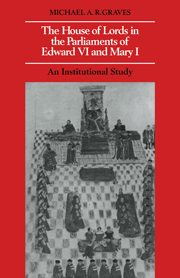Book contents
- Frontmatter
- Contents
- Dedication
- Preface
- Parliamentary sessions, 1547–8
- 1 Introduction
- 2 The composition of the House
- 3 The quality of the House
- 4 Attendance and activity, absenteeism and management
- 5 Cohesion and division
- 6 The Lords' inheritance: clerks and assistants to the House
- 7 The rules of business: procedure
- 8 The legislative record of the mid-Tudor Lords
- Abbreviations
- Appendix A Composition
- Appendix B Roll of the ‘actual’ members of the House of Lords, 1547–58
- Appendix C Attendance
- Appendix D Legislation
- Notes
- Select bibliography
- Index
3 - The quality of the House
Published online by Cambridge University Press: 03 May 2010
- Frontmatter
- Contents
- Dedication
- Preface
- Parliamentary sessions, 1547–8
- 1 Introduction
- 2 The composition of the House
- 3 The quality of the House
- 4 Attendance and activity, absenteeism and management
- 5 Cohesion and division
- 6 The Lords' inheritance: clerks and assistants to the House
- 7 The rules of business: procedure
- 8 The legislative record of the mid-Tudor Lords
- Abbreviations
- Appendix A Composition
- Appendix B Roll of the ‘actual’ members of the House of Lords, 1547–58
- Appendix C Attendance
- Appendix D Legislation
- Notes
- Select bibliography
- Index
Summary
A substantial majority of the mid-Tudor House of Lords consisted of a social elite of hereditary peers. It is an obvious truth that an hereditary elite is unlikely to possess exceptional qualities unless there exists the means to recruit new members, thereby maintaining vitality by the infusion of fresh blood, and ensuring adaptability to changing political and social conditions. In practice the Upper House was not afflicted with the deadening political consequences of a closed, self-perpetuating, noble caste. Peers constituted a majority, but they did not enjoy a monopoly of membership. The bishops sat there, not by virtue of high birth, ennoblement or heredity, but by possession of office. Doubtless a bishopric was sometimes the reward for political compliance (as was the case with the appointment of several ex-regulars to Henry VIII's new sees in 1540–2). It was, on some occasions, no more than one of the benefits of Court connections. For others, however, it was a recognition of talent or a reward for services in diplomacy and administration. In any case the peerage itself was not an exclusive, closed order, conscious and sensitive though peers were about status and rank, precedence and lineage. Dreams of an aristocratic caste were not unknown in the sixteenth century, but they were unrealistic and unlikely ever to be realised. The Upper House was never in danger of transmutation into the stronghold of an exclusive noble oligarchy.
- Type
- Chapter
- Information
- The House of Lords in the Parliaments of Edward VI and Mary IAn Institutional Study, pp. 33 - 57Publisher: Cambridge University PressPrint publication year: 1981



